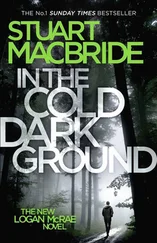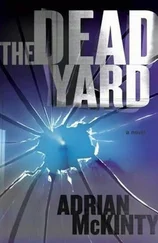Adrian McKinty - The Cold Cold Ground
Здесь есть возможность читать онлайн «Adrian McKinty - The Cold Cold Ground» весь текст электронной книги совершенно бесплатно (целиком полную версию без сокращений). В некоторых случаях можно слушать аудио, скачать через торрент в формате fb2 и присутствует краткое содержание. Жанр: Триллер, на английском языке. Описание произведения, (предисловие) а так же отзывы посетителей доступны на портале библиотеки ЛибКат.
- Название:The Cold Cold Ground
- Автор:
- Жанр:
- Год:неизвестен
- ISBN:нет данных
- Рейтинг книги:5 / 5. Голосов: 1
-
Избранное:Добавить в избранное
- Отзывы:
-
Ваша оценка:
- 100
- 1
- 2
- 3
- 4
- 5
The Cold Cold Ground: краткое содержание, описание и аннотация
Предлагаем к чтению аннотацию, описание, краткое содержание или предисловие (зависит от того, что написал сам автор книги «The Cold Cold Ground»). Если вы не нашли необходимую информацию о книге — напишите в комментариях, мы постараемся отыскать её.
The Cold Cold Ground — читать онлайн бесплатно полную книгу (весь текст) целиком
Ниже представлен текст книги, разбитый по страницам. Система сохранения места последней прочитанной страницы, позволяет с удобством читать онлайн бесплатно книгу «The Cold Cold Ground», без необходимости каждый раз заново искать на чём Вы остановились. Поставьте закладку, и сможете в любой момент перейти на страницу, на которой закончили чтение.
Интервал:
Закладка:
“We can do the old ‘no details released because we are respecting the wishes of the family’ routine.”
“Aye and speaking of that, I suppose we better go and tell the family. Her poor ma,” Brennan said.
I knew what he was angling at but there was no friggin way I was going with him. “Yes, I suppose you should go, sir. It was your case after all and you know how busy I am,” I said.
He sighed again.
“I’d appreciate it if you looked at the case file to see if there was anything that I missed,” he said as he departed.
“Not a problem, sir.”
I went to the CID filing cabinet and dug out the binder on Lucy Moore’s disappearance and carried it down to The Oak. My stomach was grumbling but someone had blown up their chef’s bus and he couldn’t get in. I ordered a Bushmills and a pint of the black and a bowl of Irish.
I opened the file. Thin. Lucy had told her mother that she was going to go to Barn Halt in Carrickfergus to catch the 11.58 a.m. train to Belfast on Christmas Eve 1980. Her mother had not been planning to go with her but after Lucy left the house she had changed her mind and got a lift to Downshire Halt (the stop before) so she could meet her daughter on the train. At 11.54 she had gotten on the train at Downshire Halt. It was a four-minute ride to Barn Halt.
A man called Cyril Peters had been driving over the Horseshoe Railway Bridge at 11.56 a.m. He had seen a woman exactly matching Lucy’s description waiting for the train at Barn Halt.
Then …
Zero.
The train came on time but Lucy had not got on.
Her mother had looked out the train window to see if she was at the halt. She not seen Lucy and then she had walked the length of the train searching for her. There were only three carriages and it didn’t take long to ascertain that she was not on board. No one had seen her. The driver hadn’t remembered if there were was anyone waiting on the platform and the passengers who had got off hadn’t remembered seeing her either.
Between 11.56 and 11.58 she had disappeared.
Lucy had said “I might stay over with some friends in Belfast, but I’ll be back on Christmas morning.”
All the friends were called. Lucy wasn’t there.
There had been no ransom demand, no confirmed sightings, no physical evidence at Barn Halt or anywhere else.
Absolutely nothing for ten days until the first of the postcards had arrived with a Cork postmark on it. It was in Lucy’s handwriting and explained that she “wanted to go find myself”. She begged her parents not to send anyone to look for her and she promised she would keep in touch with them.
She had kept in touch, sending a simple letter or plain postcard every fortnight. Brennan had kept a photocopy of several of these postcards. Some of them referred to contemporary events but none of them revealed her whereabouts, what she was doing or who she was living with. Somewhere down South from the stamps.
The postcards closed the case for the RUC because Lucy was twenty-two and therefore an adult. If she wanted to run away to parts unknown that was her business.
I read the psych. assessment, the bio and the case summary. She’d been an easy-going, fairly happy girl in her first year of an English degree at QUB when she’d met Seamus Moore. They’d got married quickly (obviously knocked up), she’d had a miscarriage and he’d almost immediately gotten arrested for weapons possession and been sent up for four years in the Kesh.
He’d joined the IRA wing as a fairly low-level prisoner.
She’d gone to see him once a week until she had bumped into Seamus’s mistress, one Margaret Tanner and there had been a blazing round right there in the visitors’ hall. Hair pulling, screaming — the prison officers must have loved it.
Divorce proceedings had been initiated.
After the divorce Lucy had moved back in with her parents.
There had been eight tips about the Moore case on the Confidential Telephone. None of them had come to anything. The IRA had been contacted through surrogates and, convincingly, denied any involvement. The UDA had also denied any connection.
Then the letters and postcards to her parents and a couple to her sister and brother.
Where would we be without postcards?
After the letters came and were authenticated the case was closed. And that was it. The whole file.
I walked to the station and called up Carrick Hospital to see if Laura was back there yet.
She wasn’t.
I talked to McCrabban about the Andrew Jackson postcard the killer had sent to me. Apparently you could buy them anywhere. None of the local newsagents remembered selling one recently.
At five o’clock my phone rang.
“Hello?”
“Is this Sergeant Duffy?”
“Yes, who’s this?”
“This is Ned Armstrong from the Confidential Telephone.”
“Hello, Ned, what can I do for you?”
“It’s what I can do for you,” Ned said good-naturedly.
“All right, Ned, I’m all ears.”
“A guy called in about ten minutes ago, saying that he quote, had a message for Carrickfergus CID. He said that he had quote killed the two fruits and he was going to kill more if his glorious deeds stayed out of the newspapers.”
“Hold on a minute, please, Mr Armstrong … Crabbie, pick up line two! … Go on, Ned.”
“Ok, I’m reading here: the guy said that he wanted the fruits to know that he was coming for them. And this was their first and last warning. He was phoning us from a call box outside the GAA club on Laganville Road, Belfast. And if the peelers went to number 44 Laganville Road they might get a wee surprise.”
“Did you tape this call?”
“No, part of the confidentiality of the Confidential Telephone is that we don’t tape or trace calls.”
“What was the man’s accent?”
“He had a broad West Belfast accent which sounded a little broader than I had ever heard before, which meant that he was hamming it up for us. People often do that or disguise their voices.”
“Anything else?”
“Not at the moment.”
“You’ve been a big help. Thank you very much, Ned.”
I wrote down the address and hung up.
The excitement was palpable. There were only half a dozen of us in the station but this was a big break.
Brennan had gone to make his notification so I sought counsel from Sergeant McCallister. “What do I do, Alan?”
“You know what you have to do. You’ve got to get up the Laganville Road. Take your team and a couple of boys. Full riot gear, mate, that’s in the bloody Ardoyne off the Crumlin Road, so, you know, if it looks dodgy at all, don’t even hesitate, scramski!”
We put on riot gear, I grabbed two reserve constables and we signed out a Land Rover.
Someone had hijacked a bus and set it on fire on the Shore Road so I drove the Land Rover along the back way. We came down into Belfast from the hills through the Protestant district of Ballysillan, which was decorated with murals of masked paramilitaries holding assault rifles and zombie armies holding Union Jacks.
We drove along the Crumlin Road and turned into the Ardoyne, a staunch Catholic estate just a couple of streets away from a staunch Protestant one — in other words, a real high heat flashpoint area.
“Does anybody know where Laganville Road is?” I asked.
Crabbie unfolded a street map and gave me directions.
We got lost twice but finally made it.
It turned out to be a small dead-end terrace, with a large graffito running the length of three houses that said, “Don’t Let Them Die!” referring, of course, to the hunger strikers.
It was teatime on a Saturday night and things looked quiet. The football matches were all over and no one was thinking about going out just yet. Maybe we could creep in and out without ever being noticed.
Читать дальшеИнтервал:
Закладка:
Похожие книги на «The Cold Cold Ground»
Представляем Вашему вниманию похожие книги на «The Cold Cold Ground» списком для выбора. Мы отобрали схожую по названию и смыслу литературу в надежде предоставить читателям больше вариантов отыскать новые, интересные, ещё непрочитанные произведения.
Обсуждение, отзывы о книге «The Cold Cold Ground» и просто собственные мнения читателей. Оставьте ваши комментарии, напишите, что Вы думаете о произведении, его смысле или главных героях. Укажите что конкретно понравилось, а что нет, и почему Вы так считаете.











